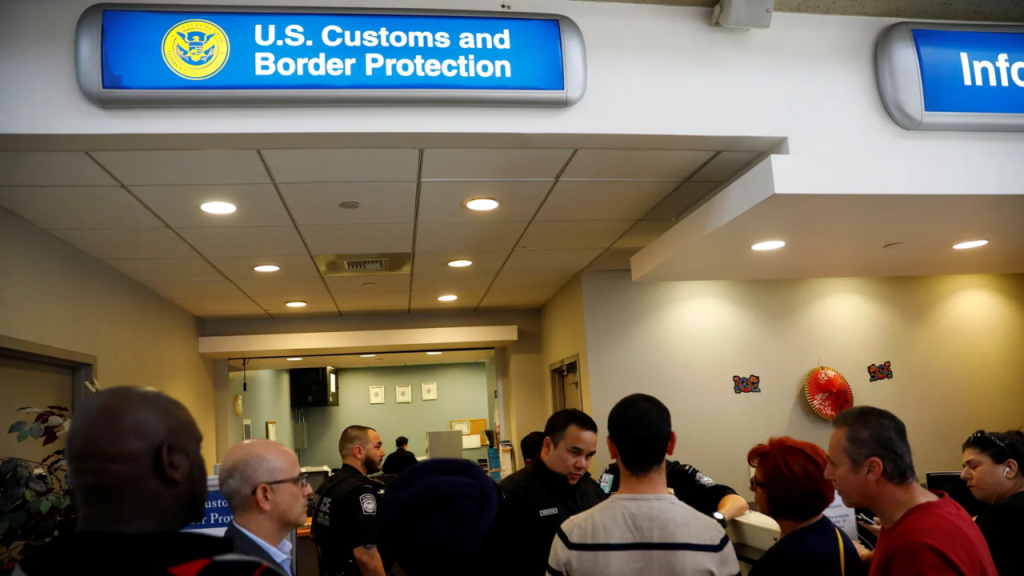
Ryan Estrada and Kim Hyun Sook had been looking forward to their summer trip to the United States for years. They had carefully planned every detail, and Kim even turned down renewing her job contract to make the trip possible. But despite all the preparations, they made the tough choice to cancel their months-long visit.
Estrada, a cartoonist, and his wife, Kim, a Korean graphic novelist, live in South Korea. The trip was a chance to visit Estrada’s family and meet with libraries across the U.S. to talk about their books.
Kim was going to travel on a tourist visa for three months, while Estrada, a U.S. citizen, had planned to arrive earlier and stay later.
But then they heard what happened to Rebecca Burke — a fellow graphic artist and friend of friends — who was detained and banned from entering the U.S. Burke, a British citizen, was traveling through North America and got stopped when heading from Seattle to Vancouver.
She had been staying in homestays, which raised red flags with border authorities.
“It just really scared me,” Estrada said. “After that, every day, there seemed to be more stories about people getting detained or deported. It was exactly what we were worried about.”
With the increasing scrutiny at U.S. borders, the detainment of green card holders, and rising travel fears under the Trump administration’s strict security policies, even some U.S. citizens are second-guessing their travel plans.
Estrada and Kim decided that bringing art supplies — and books that are banned in four U.S. states — could make them targets. One of Kim’s books is a fictional graphic novel set during South Korea’s military dictatorship in the 1980s.
Estrada said he didn’t want to choose between putting his wife at risk or leaving her behind for months. “I thought people might think we were overreacting,” he said, “but even my mom said, ‘Yeah, don’t come. It’s too dangerous.’”
A Global Pullback from U.S. Travel
This couple’s decision is just one of many. International travel to the U.S. is on the decline, and it’s already affecting the economy.
According to the National Travel and Tourism Office, international arrivals between January and March dropped 4.4% compared to the same period last year. In March alone, the drop was nearly 10%.
At Atlanta’s Hartsfield-Jackson International Airport — the world’s busiest — international passenger traffic fell almost 5% from last year, based on data from U.S. Customs and Border Protection.
There are multiple reasons for this decline. Some travelers fear getting detained or facing harsh questioning at the border. Others are simply frustrated with the U.S.’s foreign policies and choose to spend their money elsewhere.
This shift could have long-term effects, as travel and tourism contribute about 2.5% to the U.S. GDP, according to the U.S. Travel Association.
“It’s shaking everything up,” said Hicham Jaddoud, a professor of tourism at USC’s Bovard College. “People who used to visit the U.S. are now looking for other destinations, and that changes the whole picture. It affects whether they come back at all.”
Ripple Effect on the Travel Industry
Earlier in the year, U.S. tourism officials had predicted a rise in international visitors for 2025. In 2024, the country welcomed 72.4 million international tourists, up from 66.3 million in 2023. But that growth may not continue.
Tour companies, hotels, restaurants, and other travel businesses are already seeing cancellations from international visitors.
According to the U.S. Travel Association, foreign tourists generated $2.9 trillion in economic activity in 2024, supporting 15 million jobs — including hotel workers, tour guides, and taxi drivers. Canadian visitors alone spent $20.5 billion. A 10% drop in that number could mean a $2.1 billion loss.
Canadian Prime Minister Justin Trudeau recently urged citizens to vacation within Canada instead of heading to the U.S. and many are listening.
Airline bookings from Canada to the U.S. are down more than 70% each month through September. Airlines have already begun cutting flights by 3.5% between the two countries.
The political climate also plays a major role. Jodi Gibson, who lives near Toronto, used to travel often to the U.S. — attending Browns football games in Cleveland and Broadway shows in New York.
But his family recently canceled a planned trip to Disney World in Florida. Trump’s suggestion that Canada should become the 51st U.S. state pushed him over the edge.
“I canceled my season tickets this year,” Gibson said. “For the next four years, I’d rather spend my money in countries that respect ours.” The family now plans to explore Canada and take trips to Ireland and Scotland.
A Long-Term Challenge for U.S. Tourism
Experts like Jaddoud warn that this isn’t just a short-term dip. If travelers discover other destinations that feel safer and more welcoming, they may never return to the U.S., even if the political situation changes. Canada, for example, has become a new favorite for many Europeans.
“This shift in direction keeps me up at night,” Jaddoud said. “Once travelers find other places they love, it’s hard to bring them back.”
Estrada, meanwhile, doesn’t know when — or if — he and Kim will get the chance to make their trip to the U.S. “They’ve made it clear that any reason is good enough to deny someone entry,” he said.
“If you’re reading about someone this is happening to, don’t assume there’s a ‘real reason.’ It could easily happen to you.”
